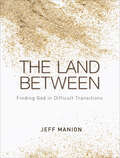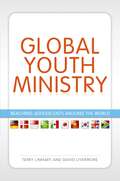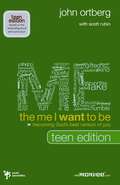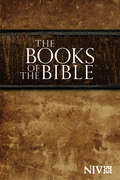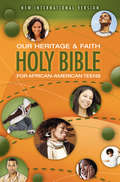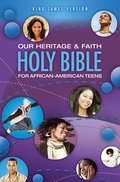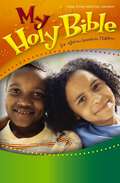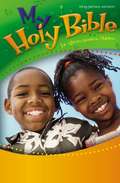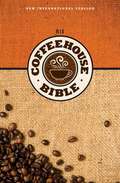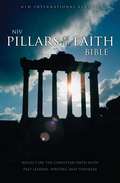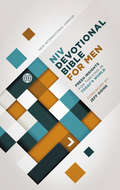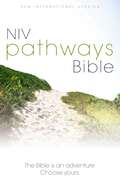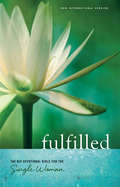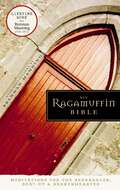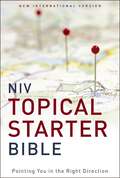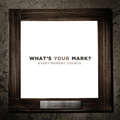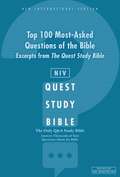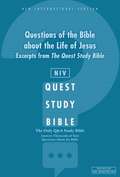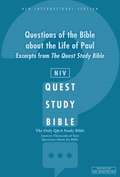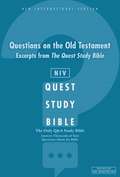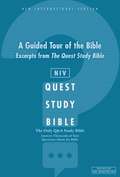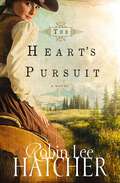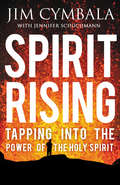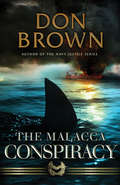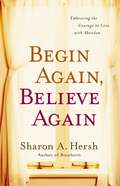- Table View
- List View
The Land Between: Finding God in Difficult Transitions
by Jeff ManionIn this Ebook edition of The Land Between, author Jeff Manion uses the biblical story of the Israelites&’ journey through Sinai desert as a metaphor for being in undesired, transitional space. After enduring generations of slavery in Egypt, the descendants of Jacob travel through the desert (the land between) toward their new home in Canaan. They crave the food of their former home in Egypt and despise their present environment. They are unable to go back and incapable of moving forward. The Land Between explores the way in which the Israelites&’ reactions can provide insight and guidance on how to respond to God during our own seasons of difficult transition. It also provides fresh biblical insight for people traveling through undesired transitions—foreclosure, unemployment, parents in declining health, post-graduate uncertainty, business failure—who are looking for hope, guidance, and encouragement. While it is possible to move through transitions and learn little, they provide our greatest opportunity for spiritual growth. God desires to meet us in our chaos and emotional upheaval, and he intends for us to encounter his goodness and provision during these upsetting seasons.
Global Youth Ministry: Reaching Adolescents Around the World
by David Livermore Terry D. LinhartAs the world's youth population continues to grow and interact globally in an instant through blogging, texting, and social networking, youth ministry is adapting in equal fashion. Authors Terry Linhart and David Livermore offer advice that's substantiated by more than twenty prominent worldwide youth leaders: be prepared. Global Youth Ministry is the first textbook to recognize the phenomenon of global youth ministry and to coordinate leading youth ministry voices in a discussion of the theological, theoretical, sociocultural, and historical issues that shape ministries around the world. Traditionally, students of international youth ministries have had to wade through a range of sources, perspectives, and agendas. This versatile text distills all that, and focuses on real-world experiences, challenges, and issues that are part of international ministries. This book is essential reading for undergraduate and graduate-level students and youth ministry leaders who have a heart for missions, social awareness and spiritual empathy, and a desire to serve young people around the world.
The Me I Want to Be, Teen Edition: Becoming God's Best Version of You
by John Ortberg Scott RubinThe Me I Want to Be by John Ortberg—the bestselling author of When the Game Is Over, It All Goes Back in the Box; God Is Closer Than You Think; and The Life You’ve Always Wanted—will help you discover spiritual vitality like never before as you learn to “live in the flow of the spirit.” But if God has a perfect vision for your life, why does spiritual growth seem so difficult? John Ortberg has some intriguing answers to that question, and he has organized his thoughts and God's words into a straightforward and timely guide for living your best life in The Me I Want to Be. This book will show how God's perfect vision for you starts with a powerful promise. All those who trust in God "will be like a tree planted by the water that sends out its roots by the stream. It does not fear when heat comes; its leaves are always green. It has no worries in a year of drought and never fails to bear fruit" (Jeremiah 17:7-8). Ortberg urges you to recognize your brokenness, understand that God is the project manager, and follow His directions. The author first helps gauge your spiritual health and measure the gap between where you are now and where God intends you to be. Then he provides detailed tasks and exercises to help you live in the flow of the Spirit, circumventing real-world barriers—pain and sorrow, temptations, self-doubt, sin—to flourish even in a dark and broken world. As you start living in the flow, you will feel: — a deeper connection with God — a growing sense of joy — an honest recognition of your brokenness — less fear, more trust — a growing sense of being “rooted in love” — a deeper sense of purpose God invites you to join Him in crafting an abundant and joy-filled life. The Me I Want to Be shows you how to graciously accept His invitation.
NIV, Books of the Bible, New Testament, eBook
by BiblicaThe Bible isn’t a single book. It’s a collection of many books that were written, preserved and gathered together so that they could be shared with new generations of readers. The Bible is an invitation to you to first view the world in a new way, and then to become an agent of the world’s renewal. The Books of the Bible, NIV helps you have a more meaningful encounter with the sacred writings and to read with more understanding, without centuries of added formatting, so that you can take your place more readily within this story of new creation. “There is no Bible more suited to reading from beginning to end.” — Scot McKnight, author of Jesus Creed Features:• Chapter and verse numbers have been removed from the text.• The books are presented instead according to the internal divisions that we believe their authors have indicated.• A single-column setting is used to present the text more clearly and naturally, and to avoid disrupting the intended line breaks in poetry.• Footnotes, section headings and any other additional materials have been removed from the pages of the sacred text.• Individual books that later tradition divided into two or more parts are put back together again.• The books are arranged in an order that helps you understand the Bible more completely.
NIV, Our Heritage and Faith Holy Bible for African-American Teens, eBook
by Cheryl And HudsonOur Heritage and Faith Holy Bible for African-American Teens in the New International Version helps teens understand their heritage and enables them to identify and interact with Scripture. Focusing on the traditions of the African-American church, the 106 pages of articles and essays help teens come to know the roots of their lives, their forms of worship, and their faith in God. Photos and illustrations are included on tip-in pages to enhance the teen’s experience of learning about their heritage.
KJV, Our Heritage and Faith Holy Bible for African-American Teens, eBook
by Cheryl And HudsonFinding a way to interest and engage teens in God’s Word has always been a challenge. Our Heritage and Faith Holy Bible for African-American Teens is the perfect resource to help teens learn more about their faith in a relevant context. It focuses on the questions that teens have about their personal faith, their heritage, and traditions of worship. This relevant Bible provides teens with answers that help them understand their African-American Christian roots while learning more about God’s Word. Teens will treasure this Bible as they come to know the roots of their lives, their forms of worship, and their faith in God. Features Include: Complete text of the King James Version, the timeless, beloved Bible translation Introductions to each book of the Bible 16 full-color tip-in pages with photographs and captions Words of Christ in red Innovative Italian Duo-Tone designs customized for guys and girls Presentation pages for gift giving
My Holy Bible for African-American Children, NIV
by Cheryl HudsonA Bible just for you! Finally, a Bible created just for African-American children. Explore God’s Word with this Bible created just for you and discover how much God knows you and loves you. • 32 full-color pages featuring art from leading African-American illustrators • Book introductions help explain what each book of the Bible is about • Large print type for easy reading • Dictionary-concordance, and color maps for better understanding • Presentation page for gift giving • Complete text of the New International Version, the most-read, most-trusted Bible translation
My Holy Bible for African-American Children, KJV
by Cheryl Hudson"African-American parents long for a Bible that can help them explain God’s Word and their faith to their children. My Holy Bible for African-American Children answers that need. Included are illustrations by African-American artists, popular Negro spirituals, Heroes of Our Faith, inspirational Christian quotes, and information that ties scripture to a child’s life. African-American children will find meaningful connections to God through features that speak directly to their life experiences and heritage. Features include: Large print type for easy reading 32 full-color tip-in pages with illustrations from African-American artists Introductions to each book of the Bible Dictionary-concordance, and maps Presentation page for gift giving Complete text of the popular King James Version with the words of Christ in red."
NIV, CoffeeHouse Bible, eBook
by Christopher D. HudsonFor many of us, the coffee shop has become our “third space”—the place we go to share life with our friends and family. It’s the place where we meet to discuss things that matter—life, love, politics, religion—and everything in between. The NIV CoffeeHouse Bible is topically divided into distinct study areas, each allowing you and your friends to consider the place of God and his Word in your life today. Studies on key life issues and important topics will engage your coffee group gatherings for an entire year and get you thinking about things that matter in this hectic world. Each of the 52 studies is broken into sections to fit the amount of time you have. You can use these ‘short’, ‘tall’, and ‘grande’ sections by yourself or with your friends.
NIV, Pillars of the Faith, eBook
by ZondervanExplore the roots of your faith in the NIV Pillars of the Faith Bible. Inside this Bible you will find the New International Version Bible text paired with 26 pages of quotes and reflections from past Christian leaders, writers and thinkers, creating a profound, reflective experience. Features:• Complete text of the world’s most popular modern-English Bible, the NIV• Quotes and reflections from past Christian leaders, writers and thinkers• “Topical Study Index,” “30-second thought starters on authentic living” and “five minute reflections on the psalms”
NIV, Bible for Men, eBook: Fresh Insights for Thriving in Today's World
by Zondervan Jeff GoinsIn a world that tells us to be and live however we want, the NIV Bible for Men inspires you to be better, dig deeper into your soul, and do more with what God gave you. Spiritually challenging and always thought-provoking, each of the daily devotions will move you toward one goal: enriching your spiritual life and relationship with God every single day.Each reading begins with a tweetable statement that introduces you to that day’s meaningful, concise topic designed to address the challenges and expectations that will instantly connect with today’s guys, such as career, sexuality, leadership, pornography, relationships, financial stability, spiritual growth, substance addiction, culture, character, education, self-image and more. The NIV Bible for Men will help you to apply the Bible to your life every day. As you read and learn, this will quickly become your go-to Bible.NIV Bible for Men features include:260 weekday devotions from young pastors and leaders such as Matt Chandler, Shane Claiborne, Craig Gross, and Gabe Lyons2 methods to engage: reading through the Bible canonically from Genesis to Revelation or by topic using the topical index52 ”Myth Articles” state commonly accepted myths in our culture today, then refute those myths with answers from God’s Word.
NIV, Pathways Bible, eBook
by ZondervanRemember as a kid how fun it was to read a book in which you could choose your own adventure? The paths were endless; every page offered a new discovery. While the Bible is one unchanging story comprised of many smaller stories, it doesn't mean you have to read it the same way every time. Often it's hard to know where to start: which path is best for me? The NIV Pathways Bible offers you multiple ways to enter into God's Word. Maybe you want to spend 30 days getting to better know Jesus. Or maybe you want to read the more obscure parts of the Bible—the not-so-famous stories. There are 20 of them provided for you. Have you ever thought about reading through the entire Bible in a year? A reading plan for doing so is in this Bible too. And if that seems too intimidating, try the 60-day overview of the Bible. The NIV Pathways Bible has so many options that you'll find fresh new ways to enter into God's Word . . . so that his Word can enter into you.
Fulfilled: The NIV Devotional Bible for the Single Woman
by Mary HollingsworthAlone with God provides what no other devotional Bible product can deliver--the full text of the NIV Bible paired with the heartfelt, practical, entertaining, and inspiring biblical insite from well-known Christian single women who understand the unique challenges of living a joyful life without a soul mate.?
NIV Ragamuffin Bible: Meditations for the Bedraggled, Beat-Up, and Brokenhearted
by Brennan ManningDo you believe that God not only loves you, but that he also likes you? It's just one of the soul-searching questions posed by bestselling author Brennan Manning who confesses he has been "John the beloved, Peter the coward, and Thomas the doubter all before the waitress brought the check." The NIV Ragamuffin Bible offers a collection of Manning’s raw, painfully honest, yet grace-filled devotions, meditations, and reflections of his journey limping back to—like the prodigal son—his overjoyed father. When you journey through this Bible, you will likewise find yourself returning to your Heavenly Father, basking in the knowledge that God not only loves you, he delights in you. Features:• Complete text of the world’s most popular modern-English Bible, the NIV• 104 Devotions guide you into a deeper connection to God and his Word • 250 Reflections help you understand what it means to be a child of God• 150 Quotes offer short but thoughtful insights into God’s kingdom
NIV, Topical Starter Bible, eBook
by ZondervanThis Bible is your GPS for a tour through the Bible.Sometimes you want to meander through your Scripture reading, and other times you want to get straight to what you’re looking for. When it’s the latter, this is the Bible for you.The NIV Topical Starter Bible puts a spotlight on a variety of important topics, making it easy for you to find the answers you’re looking for. Got a hot topic on the mind? Find it in the 700+ entry topical index in the back of this Bible. Wondering if the Bible has anything to say about the hard question your friend asked you? Search the index to find the answer.
What’s Your Mark?
by Jeremy CowartWho was Jesus? What was his story? What mark did he leave? What's your story? What will be your mark?Join celebrity photographer and social artist Jeremy Cowart as he presents 16 compelling stories of people who are making their mark today. Their stories are just a sampling of the stories that all followers of Jesus can tell—stories from those in all walks of life whose inspiration is rooted in the truths found in the Gospel of Mark. And you’ll be inspired to make your mark—whether through your occupation, your talents or your selfless love and giving to others. Your mark may be teaching children at a school or at home, helping the homeless, or providing food to the hungry. Your mark might be an accidental mark, a reluctant mark, or an intentional mark. Whatever your mark, you’ll be inspired by the stories inside this new ebook What’s Your Mark?Become a mark-maker today, and make every moment of your life count.This ebook includes:• 112 full-color pages of Scripture, stories, and photography by renowned photographer Jeremy Cowart• 16 photos and stories of people—some names you’ll recognize, others not so well known—making their mark• Scripture text of the Gospel of Mark from the bestselling New International Version (NIV) Bible
NIV, Top 100 Most-Asked Questions of the Bible: The Question and Answer Bible
by ZondervanPassages that once puzzled you become clear as you explore God's word and uncover the meaning of Scripture. This digital extract edition is designed to address the top 100 common, uncommon, and perplexing questions people ask about Scripture."Is there more to the Gospel than being assured of heaven?""Does the Bible have answers for all of today's moral dilemmas?""Why does God allow bad things to happen?While it does not contain the full Bible it does contain all the verses associated with the top 100 questions & answers Bible reading plan.
NIV, Questions of the Bible about the Life of Jesus: The Question and Answer Bible
by ZondervanThis unique Zondervan Bible Extract is one of three courses taking you quickly into passages every Christian should know. In this bite size edition you&’ll spend two weeks studying the life and teachings of Jesus from passages in Matthew, Mark, Luke, and John. Each daily reading should take only about 10 minutes. There are 14 chapters of scripture included. This digital extract edition is designed to address common, uncommon, and perplexing questions people ask about Scripture."Why was the Birth of Jesus announced to Shepherds?""What does it mean to take up one's cross?""How can we do greater things than Jesus did?"While it does not contain the full Bible it does contain all the verses associated with the Q&A on the Life of Jesus reading plan.
NIV, Questions of the Bible about the Life of Paul: The Question and Answer Bible
by ZondervanThis unique Zondervan Bible Extract is one of three courses taking you quickly into passages every Christian should know. In this bite size edition you’ll spend two weeks studying the life and teachings of Paul from passages in Acts, Romans, 1 Corinthians, Galatians, Ephesians, and Philippians. Each daily reading should take only about 10 minutes. There are 14 chapters of scripture included. You’ll also find question-based notes that clarify the meaning of the Bible text."Do all bad events have a good purpose?""When is a person old enough to make a decision to believe in Jesus?""How do we develop the Fruit of the Spirit?While it does not contain the full Bible it does contain all the verses associated with the Q&A on the Life of Paul reading plan.
NIV, Questions on the Old Testament: The Question and Answer Bible
by ZondervanThis unique Zondervan Bible Extract is one of three courses taking you quickly into passages every Christian should know. In this bite size edition you’ll spend two weeks in the Old Testament studying passages from Genesis, Exodus, 1 & 2 Samuel, 1 Kings, Job, Psalms, Isaiah, Daniel, and Amos. Each daily reading should take only about 10 minutes. There are 14 chapters of scripture included. You’ll also find question-based notes that clarify the meaning of the Bible text."Would God ever ask us to do wrong?""Who is God, what does He value, and how can we approach Him?""How can God be both a powerful ruler and a gentle shepherd?"While it does not contain the full Bible it does contain all the verses associated with the Q&A on the Old Testament reading plan.
NIV, A Guided Tour of the Bible: The Question and Answer Bible
by ZondervanThis unique Zondervan Bible Extract offers daily readings consisting of 180 selected passages, including at least one chapter from each of the Bible’s 66 books. You can read both the chapter and its accompanying question-based notes that clarify the meaning of the Bible text in 15 minutes per day.With a few exceptions, the Biblical material appears in chronological order. You will read the psalms attributed to David as you read about David’s life. You will read the prophets along with their background history. Portions from the Gospels, too, are interspersed, giving a composite picture of Jesus’ life on earth; Paul’s letters are scattered throughout the record of Jesus’ life.
The Heart's Pursuit
by Robin Lee HatcherA Colorado beauty abandoned at the altar. A rugged bounty hunter haunted by his past. In this dramatic historical novel by best-selling author Robin Lee Hatcher, two wounded hearts join forces in a pursuit across the Old West. Silver Matlock is a Colorado beauty in search of revenge against the man who stranded her at the altar and fled with the remnant of her family's fortune. She is determined to find the man who betrayed her trust. Jared Newman, rugged as the West itself, is relentless in his pursuit of lawless men—but unable to escape his own tragic past. Hardened by his life as a bounty hunter, he must learn to forgive before he loses his soul. Joining forces, the two set out in search of Silver's betrayer. The handsome but embittered Jared finds himself powerfully drawn to the beautiful woman whose drive for justice equals his own. But lack of honesty keeps Silver and Jared from fully trusting each other, even as a shocking revelation intensifies their pursuit of the cunning—and deadly—quarry. "Hatcher delivers another thought-provoking historical novel." —CBA Retailers + Resources
Spirit Rising: Tapping into the Power of the Holy Spirit
by Jim Cymbala Jennifer SchuchmannFor some of us being a Christian is harder than it should be. Discouraged, anxious, worn down, we wonder what happened to the power and the joy that Jesus promised. Jim Cymbala believes that many of us are missing something vital. Christianity, he says, for even the best-intentioned person or church, is impossible without the Holy Spirit. You can have regular devotions, great preaching, a strong emphasis on the Bible, a great worship team, and a congregation that is trying, but if you aren’t vitally in touch with God’s Spirit, you are missing out on the life God has for you. The Holy Spirit, he points out, is God’s agent on earth. Yet he is the least understood, least preached about, and least discussed member of the Trinity. That is sad, because without him, our spiritual lives will always become dry, mechanical, and a struggle. Too often, the body of Christ is divided into two sides. One side stresses the Word of God, separating itself from what it views as the emotional fanaticism often linked to those emphasizing the Holy Spirit. The other side is sometimes known for drifting into unbiblical manifestations and unorthodox teaching while attributing it all to the Spirit of God. But the Christianity we see in Scripture is both grounded in the Word and full of the Spirit. With stunning stories of how God is working in the lives of people and churches today and biblical teaching about the Holy Spirit, Jim Cymbala invites you to experience God in a fresh and vital way. Nothing else will change our prayer life, our study of God’s word, and our worship more than opening our hearts to the Spirit. If we want power, confidence, joy, peace, and more love in our lives, then we need a better understanding of how and why the Spirit moves so we can join him there.
The Malacca Conspiracy
by Don BrownSet in Singapore, Indonesia, Malaysia, and the United States, The Malacca Conspiracy is a bone-chilling tale of terrorism on the high seas, of political assassination and nuclear brinkmanship. And for Zack and Diane—your favorite JAG characters from Don Brown’s popular Navy Justice Series—a story of hope for a longstanding romance that is now or never. When a dastardly plot is hatched in the Malaysian seaport of Malacca to attack civilian oil tankers at sea, to drive up the price of crude oil futures, and to assassinate the Indonesian president and use fat windfall profits to finance a nuclear attack against American cities, Navy JAG officers Zack Brewer and Diane Cocernian reunite in a sizzling race against the clock to foil the conspiracy before disaster strikes. But as President Mack Williams sends ships of the U.S. Seventh Fleet towards the Malacca Straights to reassert control over the sea lanes, will Navy JAG officers Zack Brewer and Diane Colcernian survive this dangerous and final high-stakes drama of life and death? You won’t be able to put this thriller down until you find out.
Begin Again, Believe Again: Embracing the Courage to Love with Abandon
by Sharon A. HershOur hearts as women were made by God for relationships. Why is it, then, that the thing we most deeply desire—relationships—becomes the source of so much pain? Difficult marriages, the loneliness of being single, problem children, abusive employers, fractured friendships...life's realities are often very different from the dreams we dreamed for ourselves as girls. How do we live with this beautiful ache for relationships in a world that doesn't always work? When we've been betrayed, how do we trust again? When we've been disappointed, how do we hope again? When we've been terribly hurt, how do we love again? In this honest, intimate, and transformative book, counselor Sharon Hersh helps you gain a new, truly biblical perspective on relationships that can help you endure the heartaches and still come up living wholeheartedly, loving with abandon, and daring to hope and believe. The stories of the women in this book, including that of the author, are signposts that point you beyond the sometimes devastating problems of life to the deep, rich reason and root of all relationships, both good and bad: God's desire for relationship with you. In Sharon's words, “Relationships are not the destination—they are the path to something more.”
